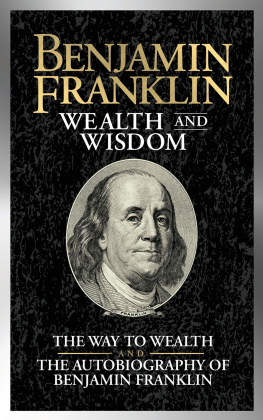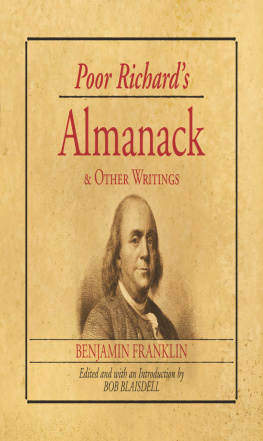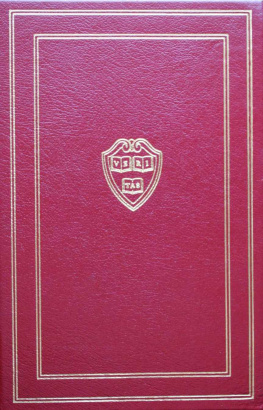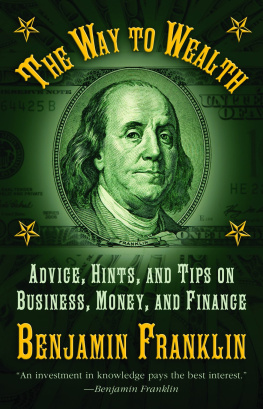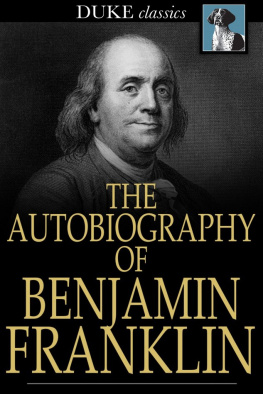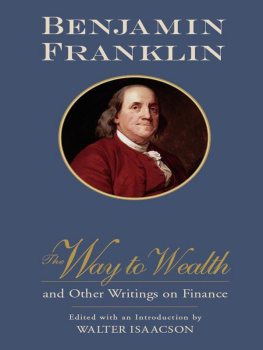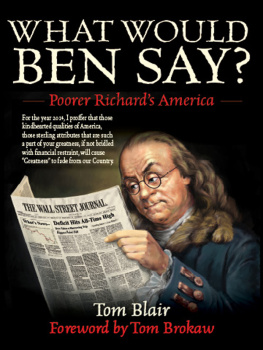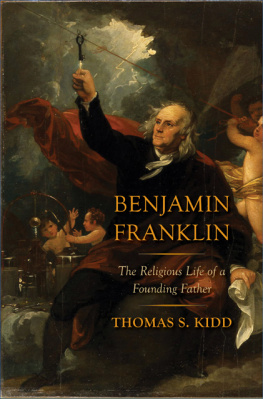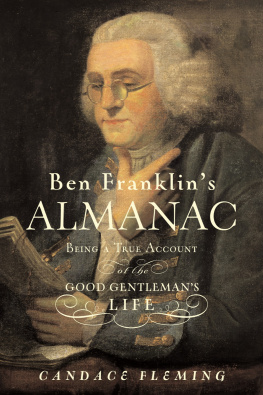Table of Contents
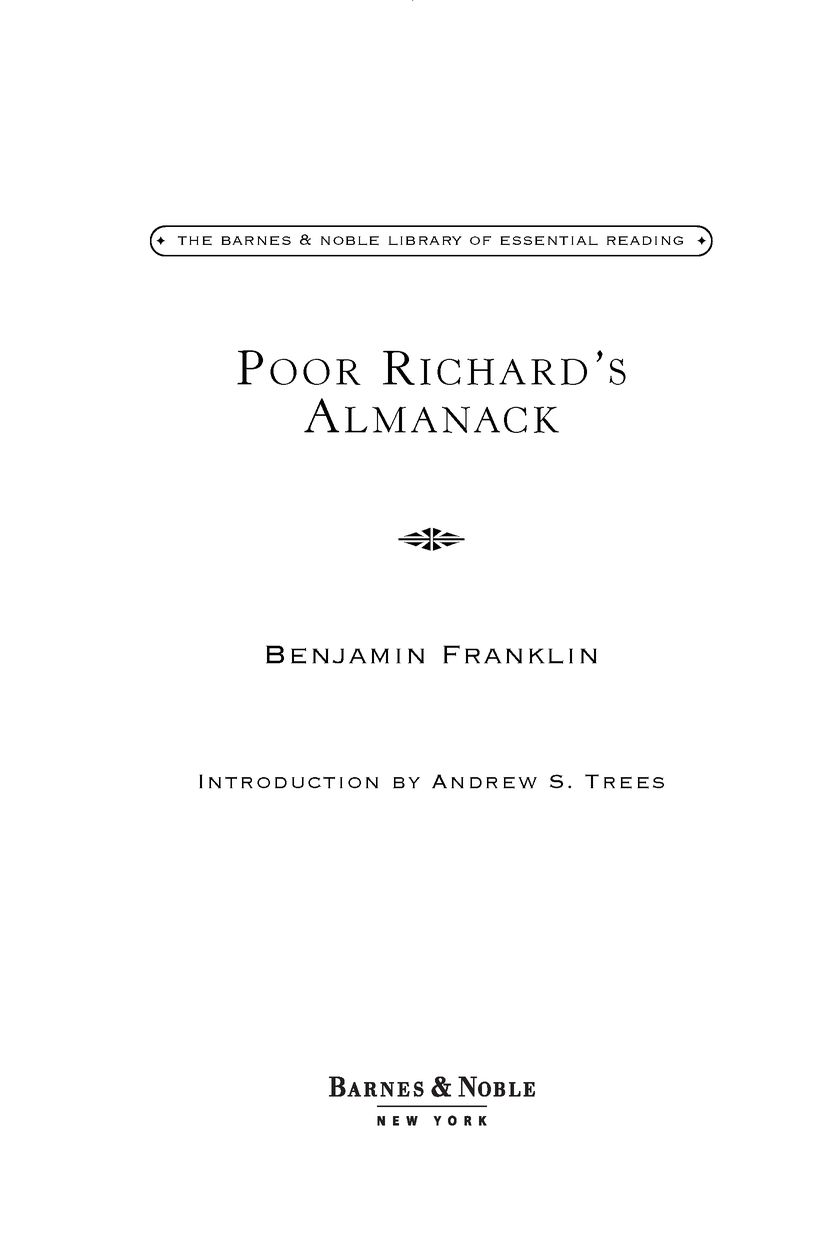
INTRODUCTION
POOR RICHARDS ALMANACK IS ONE OF BENJAMIN FRANKLINS MOST beguiling creations. He delighted in cloaking his writing behind a variety of literary personas, and Richard Saunders remains one of his most beloved, although some critics have complained that Poor Richard reveals the shallow materialism at the heart of Franklins homespun philosophy and, by extension, at the heart of America itself. The Almanack holds a central place in understanding Franklin and his evolution from humble tradesman to founding father as well as providing a fascinating window into colonial America. And Franklins sharp wit as it found expression through his literary alter ego still retains its ability to surprise and delight readers today.
Franklin (1706-1790) was a man of many rolesprinter, author, philosopher, scientist, inventor, diplomat, and politician to name only a few. He lived a wide and varied life and found himself at the center of virtually every major event involving America during the second half of the eighteenth century. He was so successful as a businessman that he was able to retire at the age of forty-two. He proved equally adept at science, and his experiments in electricity made him the most famous American in the colonies. Politics and diplomacy took up much of the latter half of his life, and he showed himself a master of these as well, perhaps most importantly by securing the support of France during the American Revolution. And his Autobiography made him the role model for countless future generations who hoped to emulate his rags-to-riches story. To understand Franklin is, to a large extent, to understand early America.
Born in Boston as the eighth child of ten to a pious Puritan family, Franklin knew from an early age that success would come only from his own efforts. After some initial indecision about his career, he was apprenticed to his brother James, who was a printer. The choice was a fortunate one. The profession would give Franklin an influence far beyond that of almost any other trade. Franklin chafed under what he considered his brothers overbearing manner, and he eventually broke his indentures and ran away to Philadelphia in 1723 where he soon found a job with another printer. He opened his own printing shop a few years later. In 1729, he acquired a newspaper, the Pennsylvania Gazette. He also did most of the public printing in the colony and served as the postmaster for Philadelphia.
In 1732, Franklin began publishing Poor Richards Almanack, which played an important role in establishing his wealth. Franklin had originally published others almanacs, but in the waning months of 1732 he found himself without one to publish. Rather than lose the lucrative business, he decided to write his own, lifting the name Richard Saunders from the deceased astrologer-doctor and appropriating the title of his brother James almanac, Poor Robins Almanac.
After the Bible, the book most likely to be found on the shelves of colonial Americans was an almanac. Among the earliest known publications in many parts of the world, almanacs usually include a calendar, as well as a variety of data, including the rising and setting of the sun and moon, the phases of the moon, the positions of heavenly bodies, eclipses, high and low tides, holy days, holidays, and other miscellaneous information. This was essential knowledge for people in the eighteenth century. Sailors and fisherman relied on the information about the tides. Farmers used the book to determine when to plant crops and when to harvest them. And knowing the phases of the moon was useful for travelers in an era when there was little artificial light at night.
One almanac was a great deal like another, however, so style was essential to differentiate ones self from the crowd. And style was something that Franklin was almost effortlessly able to command. Although his format followed that of other almanacs, Franklin created a distinctive voice through the character of Poor Richard and showed a knack for marketing his new creation. In the first edition of 1733, Franklin, speaking as Poor Richard, frankly avowed his pecuniary motives for publishing an almanac (perhaps an echo of Franklins own belief that honesty was the best policy) and also flattered his audience, something at which Franklin was always a master. Courteous Reader, I might in this place attempt to gain thy favour by declaring that I write almanacks with no other view than the public good; but in this I should not be sincere, and men are nowadays too wise to be deceived by pretenses how specious soever. Instead, Saunders readily admitted his lack of money: The plain truth of the matter is, I am excessively poor, and my wife, good woman, is, I tell her, excessive proud. With that introduction, Poor Richard had established himself as a man much like his almanac readers, an adept common touch that was always a hallmark of Franklins writing.
Franklin also relied on an elaborate hoax to promote his almanac. Borrowing a stratagem from Jonathan Swift, Saunders solemnly predicted the exact hour of the death of one of the leading almanac writers in America. When the other writer took the bait and complained in his own almanac about Saunders falsehood, Franklin continued to elaborate on the hoax in ways that furthered the notoriety and popularity of Poor Richard. Although Poor Richards Almanack never became the best-selling almanac in America, it developed a loyal following and sold an average of approximately ten thousand copies a year.
Franklins almanac was different from others in one further way. Every almanac offered wit and wisdom culled from a variety of sources. And Franklin freely admitted that most of his own sayings were borrowed from others. What distinguished Franklin from his peers was his ability to distill these sayings to a sharp edge, so much so that many of them remain in circulation today, permanently anchored in our collective national memory. A great many of todays common proverbs (such as A word to the wise is enough, God helps them that help themselves. or Early to bed, and early to rise, makes a man healthy, wealthy, and wise) owe their distinctive phrasing to Franklins economical wit.
Franklin published the almanac annually from 1733 to 1758. During that period, Poor Richard changed character in a number of ways. He was originally a dim-witted and somewhat foolish astronomer. Over time, he became the more famous Poor Richard, a pious country dweller who was a never-ending source of proverbs on the value of frugality and hard work. During roughly the first decade of publication, the emphasis was on entertainment. In later years, it developed a moral and didactic tone and attempted to improve and educate its readers. The format also shifted. For the first fifteen years, the Almanack contained six pages of introductory matter and general information, a page for each month, and six additional pages of general information at the back. In the final decade, when it was renamed Poor Richard Improved, the almanac was expanded to thirty-six pages, and Franklin devoted the additional pages to historical events and literary and scientific essays, producing a kind of general magazine designed not simply to entertain but to educate his readers. The shift in format and tone mirrored Franklins own growth into a well-known citizen of Philadelphia. His writing became less comical, combative, and bawdy and developed a more mature and measured tone, reflecting Franklins growing public reputation and responsibilities.
During his years as a printer, Franklin played an increasingly important and influential role in the civic life of Philadelphia. He became actively involved in numerous voluntary ventures to improve life in Philadelphia, a kind of practical application of many of the precepts he enumerated in his almanac. In 1731, with a group of friends, he established the first circulating library in America, which came to be emulated throughout the colonies. He founded a fire company (1736), the American Philosophical Society (1743), a college that later became the University of Pennsylvania (1749), an insurance company (1751), and a city hospital (1751). He also organized a number of other improvements in city life, such as streetlight and street cleaning. In his


